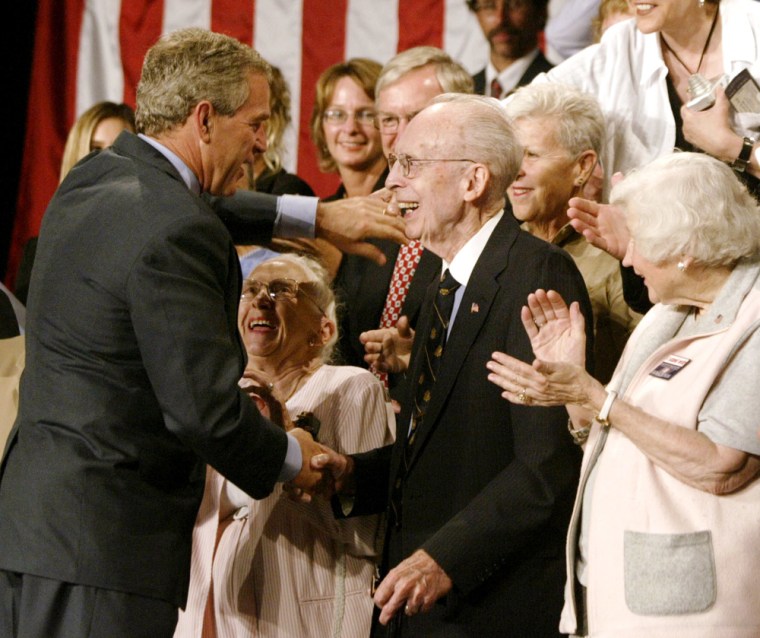With a week of tributes to the late President Reagan concluded, President Bush and Sen. John Kerry stowed the funeral decorum Monday and returned to the campaign trail to fire fresh barbs at each other over economic issues.
John Kerry’s campaign issued a report that says the middle class is still struggling under lower incomes, debt and higher household costs despite recent job growth.
Meanwhile, Bush took a trip to Missouri to defend his new Medicare drug program.
Both candidates refrained from overt campaigning last week as the nation took time to honor Reagan, the nation’s 40th president who died June 5 at age 93.
With Bush touting nearly 1.2 million jobs created this year, Kerry will try to blunt his rival’s good news by focusing over the next two weeks on economic problems affecting families, beginning with stops in New Jersey, Ohio and Michigan.
But Bush’s re-election campaign said the economy is growing, and that Kerry chooses to focus on the negative in a “misery tour.” Bush is running a television ad that makes the same point and says of Kerry: “Pessimism never created a job.”
Bush campaign spokesman Steve Schmidt said the economy and the manufacturing sector are growing at the fastest rates in 20 years and home ownership is at a record high. But economic numbers can be sliced different ways, and the Kerry campaign is focusing on the 1.6 million households that filed for bankruptcy last year; increasing costs for health insurance, child care, gas and tuition; and overall job losses.
Defending drug plan in Missouri
In Missouri, a crucial swing state where the two men are tied, Bush was defending his new Medicare prescription drug discount cards that are coming under increasing criticism from Democrats.
In the 18th trip of his presidency to the “Show Me State” and the fifth this year, Bush says the program that started June 1 marks a major step forward in ensuring affordable medicine vital to the health of the elderly. He takes that message Monday to an audience of 500 health care professionals and senior citizens in the Kansas City suburb of Liberty.
On his way to the community center, Bush stopped with Wanda Blackmore of Kansas City, Mo., to pick up a prescription at a pharmacy. She saved $17 by using her discount card, which she received on June 5. Before getting the card, Blackmore said she paid about $125 to $150 a month for her prescriptions.
Some Democrats say the program has major problems. The number of seniors signing up for the cards has been lower than expected. The sign-up process is “hopelessly confusing,” said Senate Democratic Leader Tom Daschle of South Dakota. Kerry’s campaign says 20 of the 73 companies selected by the Bush administration to provide the cards have been involved in allegations of fraud, 11 of them for defrauding Medicare.
Underscoring the concern, Sen. Jim Talent and Rep. Kenny Hulshof, both Missouri Republicans, conducted a town meeting Monday with seniors in the university town of Columbia, another area of Missouri that is critical to Bush’s efforts to carry the state as he did four years ago.
The Bush administration says the cards will save their users up to 18 percent on average on retail prices for brand-name prescription medicines. Some 7.3 million Medicare recipients could get cards, including 4.7 million with incomes low enough to receive $600 from the federal government this year and again in 2005 to pay pharmacy bills.
About 2.4 million of the 3 million-plus enrollees to date are members of health maintenance organizations who were enrolled automatically in their HMOs’ card programs. Another 400,000 low-income Medicare recipients, who already receive help with their prescriptions, are in the process of being enrolled by state drug assistance programs.
On the job front, Democrats continue to point out that despite a recent hiring spree, a net of 1.2 million jobs have been lost since Bush took office in January 2001. The Kerry campaign report says Bush has the worst jobs record of any president who has run for re-election in nearly 60 years.
Time factor
Kerry economic adviser Gene Sperling said it will take time for the economy to recover after months of sustained job losses early in the Bush administration.
“If you get D-minuses for three and a half years in college, one semester with a B-minus doesn’t put you on the honor roll,” Sperling said. “And our economy does not recover after three and a half extremely weak years of job creation with just a few positive months.”
Kerry’s focus on the economy comes as the administration prepares for the June 30 transfer of limited political power in Iraq. But Kerry strategist Tad Devine said voters will continue to focus on the economy.
The Kerry campaign report says the new jobs that have been created since January pay less than those lost since Bush took office. Bush’s campaign says Kerry’s analysis is flawed.
“John Kerry is traveling the country delivering a message of gloom and doom and filled with pessimism that is completely disconnected with reality,” Schmidt said.
Bush’s campaign cited U.S. Bureau of Labor Statistics figures showing the average salary for non-supervisory workers at $15.64 an hour.
But the bureau also reports that a bulk of the new jobs — 978,000 — come from the private services sector, where the average hourly salary is $15.24. Of the sector’s professional and businesses services jobs created in May, nearly half are temporary help, the bureau said.
